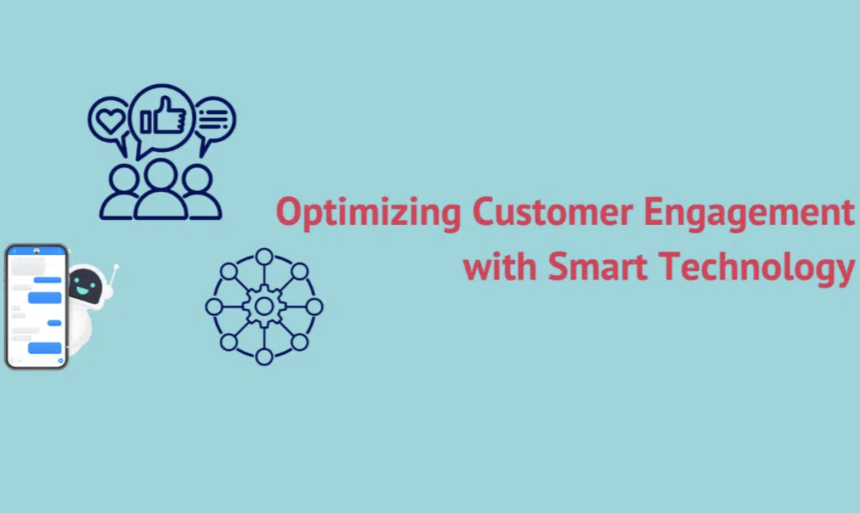For businesses aiming to enhance customer experiences, optimizing customer engagement has become a crucial necessity rather than a luxury. Smart technology emerges as a game-changer in customer engagement, with omnichannel software enabling companies to build deeper connections and deliver tailored interactions that truly resonate.
This guide explores cutting-edge solutions at your disposal, from AI-driven personalization to immersive AR/VR experiences. Leverage advanced communication tools, emotional engagement strategies, and real-time data utilization to their full potential.
Prepare to dive into invaluable insights, actionable strategies, and expert tips. Whether you are a seasoned pro or just starting, this guide provides a roadmap to supercharge your customer engagement strategies.
AI and CRM for Personalized Customer Interactions
At the heart of personalized customer interactions lies the integration of Artificial Intelligence (AI) with Customer Relationship Management (CRM) systems. This powerful combination unlocks a wealth of insights into customer behavior and preferences, enabling companies to tailor their approach and deliver highly personalized experiences.
Predictive Modeling and Customer Retention
One of the key advantages of AI-powered CRM systems is their ability to leverage predictive modeling. By analyzing vast amounts of customer data, these systems can identify patterns and anticipate future behaviors, such as potential churn risks. Armed with this knowledge, businesses can proactively implement targeted strategies to enhance customer retention and reduce churn.
Personalized Recommendations and Upselling
AI-driven CRM systems can also leverage customer data to make personalized recommendations and identify upselling opportunities. By understanding individual preferences and behaviors, these systems can suggest tailored products or services, enhancing the customer experience and driving increased revenue.
Advanced Communication Technologies
Nowadays, customers demand immediate and contextually relevant communication. Omnichannel call center software is at the forefront of addressing this need, offering round-the-clock support and personalized assistance. AI-driven chatbots and in-app messaging technologies complement these systems, providing prompt responses and resolving inquiries without delays.
Personalized Customer Journeys
By leveraging customer data and machine learning algorithms, advanced communication technologies can personalize the customer journey. The integration of a call center phone systems approach allows businesses to provide a consistent and personalized customer journey across all touchpoints, enhancing satisfaction and loyalty.
Continuous Operation and Complex Interactions
Unlike traditional customer service channels, AI-powered chatbots and messaging systems operate continuously. The omnichannel call center utilizes AI to manage and synthesize interactions across various platforms, ensuring that no customer query goes unanswered, regardless of the chosen communication channel.
Emotional and Participatory Engagement Strategies
While technology plays a crucial role in optimizing customer engagement, businesses must not overlook the importance of emotional connections and participatory elements. Leveraging emotions to resonate with customers on a deeper level can foster long-lasting loyalty and advocacy.
Customer Feedback and Co-Creation
Participatory engagement strategies, such as soliciting customer feedback and involving customers in the co-creation process, can further enhance loyalty and brand advocacy. Utilizing omnichannel customer support software allows for a more unified and comprehensive collection of feedback across various communication channels.
This integration ensures that customers who feel valued and heard are more likely to remain engaged and invested in a brand’s success, regardless of how they choose to communicate.
IoT and Real-Time Data Utilization
The Internet of Things (IoT) has revolutionized the way businesses engage with customers. By leveraging real-world data from connected devices, companies can personalize the customer experience like never before.
Utilizing an omnichannel cloud contact center, businesses can dynamically adapt communication strategies in real time, enhancing the responsiveness of customer service operations.

Predictive Maintenance and Proactive Service
IoT technologies enable businesses to monitor product usage and performance, allowing them to predict maintenance needs and provide proactive service. This proactive approach not only enhances customer satisfaction but also strengthens brand loyalty and trust.
Personalized Experiences Based on Real-Time Data
Moreover, IoT data can be utilized to deliver personalized experiences tailored to individual preferences and behaviors. For example, smart home devices can learn a user’s routines and adjust settings accordingly, creating a seamless and personalized experience.
Enhancing Engagement with AR, VR, and Facial Recognition
Emerging technologies like Augmented Reality (AR), Virtual Reality (VR), and facial recognition are pushing the boundaries of customer engagement, offering immersive and personalized experiences that captivate and delight.
Immersive Brand Experiences with AR and VR
AR and VR technologies allow customers to virtually experience products or services before making a purchase decision. This not only enhances the customer journey but also provides valuable insights into user preferences and behaviors.
Facial Recognition for Security and Marketing
Facial recognition technology can be leveraged for both security and marketing purposes. In terms of security, it can enhance customer identification and authentication processes, while in marketing, it can enable personalized experiences based on facial recognition data.
Leveraging AI for Voice Analytics
Voice analytics driven by AI can significantly enhance customer engagement by providing valuable insights into customer sentiment and behavior. By analyzing voice data from customer interactions, AI algorithms can detect emotions, tone, and intent, enabling businesses to respond appropriately and tailor their approach accordingly.
This technology can identify potential areas of frustration, dissatisfaction, or confusion, allowing companies to address these issues proactively and improve the overall customer experience. Additionally, voice analytics can be used to monitor agent performance, identify training opportunities, and ensure consistent service quality across all customer touchpoints.
Metaverse and Immersive Customer Experiences
The emergence of the metaverse, a virtual shared space, presents exciting opportunities for customer engagement. By creating immersive virtual environments, businesses can offer interactive product demonstrations, virtual showrooms, and even simulated experiences.
Customers can explore and interact with products or services in a highly engaging and personalized manner, blurring the lines between the digital and physical worlds. The metaverse also opens up new avenues for virtual events, workshops, and customer support, enabling businesses to connect with their audience in innovative ways.
As this technology continues to evolve, it holds the potential to revolutionize customer engagement by providing unparalleled levels of immersion and interactivity.
Comparison Table: Traditional vs. Smart Customer Engagement Strategies
| Feature | Traditional Approach | Smart Technology Approach |
| Personalization | Limited by manual data analysis | AI-driven personalization based on customer data |
| Communication | Restricted to traditional channels | Omnichannel support with AI-powered chatbots and messaging |
| Customer Insights | Reactive and based on limited data | Proactive and driven by predictive analytics |
| Emotional Connection | Largely overlooked | Leveraged through emotional advertising and participatory engagement |
| Customer Experience | Static and product-centric | Dynamic and tailored to individual preferences and behaviors |
| Innovation | Limited by legacy systems | Constantly evolving with emerging technologies like IoT, AR, and VR |
Conclusion
Harnessing smart technology optimizes customer engagement opportunities. Integrate AI, advanced communication tools, emotional strategies, IoT, and immersive experiences to cultivate personalized, seamless interactions and lasting loyalty.
Continuously adapt and adopt new technologies into your engagement approach to stay ahead of evolving customer expectations. Implement innovation, and your business will achieve remarkable success in capturing and retaining customers.
Frequently Asked Questions
1. How can AI in CRM systems improve customer retention?
AI-powered CRM systems analyze customer data to predict churn risks and enable targeted actions to retain at-risk customers.
2. What are the benefits of AI-driven chatbots in customer engagement?
AI chatbots provide immediate, personalized responses, handle complex interactions, and operate continuously to enhance customer support.
3. How can IoT technology enhance the customer experience?
IoT enables predictive maintenance, proactive service, and personalized experiences based on real-time data from connected devices.
Lynn Martelli is an editor at Readability. She received her MFA in Creative Writing from Antioch University and has worked as an editor for over 10 years. Lynn has edited a wide variety of books, including fiction, non-fiction, memoirs, and more. In her free time, Lynn enjoys reading, writing, and spending time with her family and friends.















